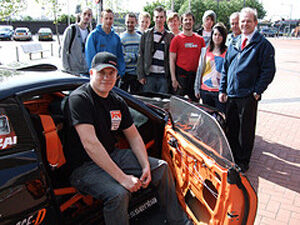University News Last updated 11 June 2009

Young directors of growing Birmingham-based specialist automotive business Driftworks Ltd, have given Birmingham City University Motorsport students insights as to how their specialist form of motor-sport has led to a successful business. Technical collaboration may offer local manufacturing opportunities.
From an extreme sports background, Phil Morrison and James Robinson explored the sport of ‘Drifting' as a modestly priced form of motor sporting hobby. As they progressed the pair saw an opportunity to use their accumulated knowledge and enthusiasm to develop a business. In 2004 they established their Tyseley-based Driftworks, now a hub for the growing Drifting community.
‘Drifting' as a sport originated as a popular technique in Japanese touring car racing in the seventies, championed by legendary motorcyclist Kunimitsu Takahashi. Famous for hitting the corner apex at high speed, he intentionally oversteered, drifting through the turn, whilst preserving vehicle control and high exit speed.
Phil Morrison explains: "Drifting is now an international specialised form of extreme motor-sport. Big in Japan and the USA, it is mushrooming across Europe with four championships taking place at specially laid out, fully viewable sections of regular racing circuits, such as Silverstone. Events are a great spectacle and, with ingenuity, offer a lower cost way of participating in motor sport. Up to sixty vehicles compete at larger meetings."
Morrison and Robinson explained to the University's motor sport technology and computer-based automotive design students, key engineering aspects of creating a competition ‘drifting' car. Whilst power is a major aspect, competitions rely on the vehicle being sideways-on throughout the twisty circuit once it reaches high ‘entry speed'.
James Robinson says: "Power must be delivered effectively to the road. Our engineering efforts concentrate on suspension, steering control - with the right ‘sticky' tyres. A car can approach the first turn at over a hundred miles an hour, then be driven in full drift-mode - the more sideways the better for the judges! Points depend on driver skill, line and accuracy of control - not just speed."
Because Drifting performance relies on top quality components, Driftworks' business is built on supplying parts to the growing, enthusiast community. With early competitors based on Japanese models -,such as reigning European Champion Morrison's own 670HP Nissan Silvia, S15 - many components are Far East-sourced. Driftworks wants to change that and is working with Birmingham City University's technologists to introduce UK-sourced, quality-engineered Driftworks-branded parts.
Phil Morrison says: "The University team help us, with techniques such as finite elements analysis, to see how components can safely be refined to offer strength, yet with lightweight. Materials analysis, coatings and exploring our own design ideas benefit from this collaboration as we anticipate exploring local supply sources."
With Driftworks cars leading in three out of four European competitions, and a thriving international business, through on-line marketing, the company is now the UK's information hub for Drifting.
Birmingham City University's Motorsports Technology degree course director, David Jones, says: "Driftworks is a home grown success story offering role models to inspire our students through combining technology with enterprise. It is especially pleasing to have our technical team help develop potential for West Midlands engineers to supply specialised parts into a small, but growing market."
Anyone seeking to explore motor-sport or other Birmingham, City University automotive and engineering design courses should phone 0121 331 5400 or email course.enquiries@tic.ac.uk. More information about Driftworks can be found at http://www.driftworks.com/
For further information please contact Birmingham City University Media Relations Office on 0121 331 6738, email press@bcu.ac.uk or out of hours on 07967 271 532.